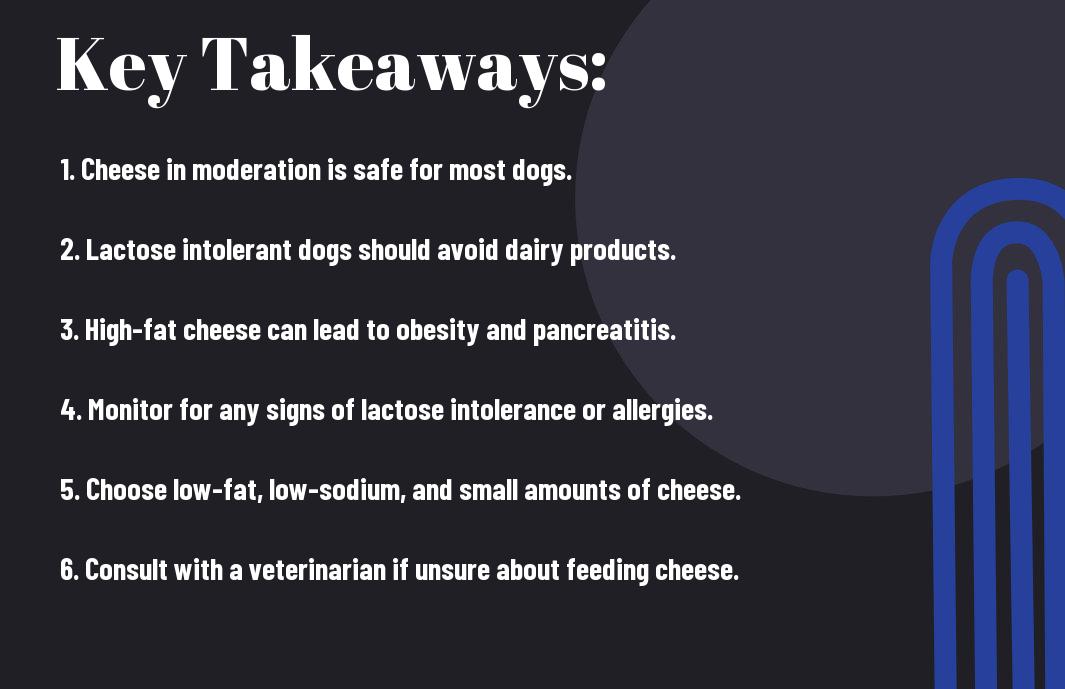Many pet owners wonder, “Is cheese OK for dogs?” So let me tell you, dear reader, in a playful way! Cheese can be a tasty treat for your furry friend, but there are things to consider before you feed them a slice or two. Too much cheese can upset their tummy, but in moderation, it can be fine and dandy. Just remember, every dog is different, so what works for one may not work for your Andy! So, be cautious and don’t overdo it, and your pup will surely thank you for it!
Key Takeaways:
- Cheese can be given to dogs in moderation: While cheese can be a tasty treat for dogs, it should be given in moderation to avoid potential stomach upset or weight gain.
- Avoid certain types of cheese: Dogs should not be fed cheese varieties that are high in fat, sodium, or have added ingredients like garlic or onions, as they can be harmful to dogs.
- Monitor your dog’s reaction: When introducing cheese to your dog’s diet, it’s important to monitor how they respond. Some dogs may be lactose intolerant or have sensitivities to dairy, so it’s best to start with small amounts and observe any potential reactions.
The Good Stuff
Nutritional Benefits of Cheese
The nutritional benefits of cheese for your furry friend are significant. Cheese is a good source of protein, which is important for building strong muscles and tissues in your dog’s body. Additionally, cheese contains important vitamins and minerals such as calcium, which helps support bone health and teeth strength.
Can Dogs Digest Cheese?
An important question to consider is whether dogs can digest cheese. While cheese can be a tasty treat for your pup, it’s important to note that some dogs may have difficulty digesting dairy products due to lactose intolerance. If your dog experiences symptoms like gas, diarrhea, or vomiting after consuming cheese, it may be best to avoid feeding it to them in the future.
Understanding your dog’s individual digestive capabilities is crucial when determining whether cheese is suitable for them. If your dog enjoys cheese and can digest it without any issues, it can be a delicious and nutritious snack to incorporate into their diet in moderation. As always, it’s important to consult with your veterinarian to ensure that cheese is a safe and healthy treat for your furry friend.
The Not-So-Good Stuff
Some aspects of feeding cheese to your furry friend may not be the best idea. Let’s explore some reasons why you might want to limit your dog’s cheese intake.
Lactose Intolerance in Dogs
Lactose, a sugar found in dairy products like cheese, can be difficult for some dogs to digest. If your dog is lactose intolerant, consuming cheese can lead to digestive issues such as gas, bloating, diarrhea, and stomach discomfort. Just like some people, some dogs lack the necessary enzyme, lactase, to properly break down lactose.
High Fat Content in Cheese
Content
Cheese is high in fat, which can be problematic for dogs, especially those prone to obesity or pancreatitis. While fat is an necessary part of your dog’s diet, too much of it can lead to weight gain and other health issues. Feeding your dog cheese in moderation is key to preventing these problems.
Potential Allergies and Sensitivities
NotSoGood
If your dog has allergies or sensitivities, cheese could potentially trigger a reaction. Some dogs may be allergic to specific types of cheese or dairy products in general. Symptoms of an allergic reaction can vary and may include itching, redness, swelling, and digestive upset. It’s necessary to monitor your dog for any signs of allergies when introducing cheese into their diet.
With that said, it’s crucial to consider your dog’s individual dietary needs and any pre-existing conditions before sharing cheese with them. Keeping an eye out for any adverse reactions and feeding cheese in moderation can help you determine if it’s a suitable treat for your pup.
Types of Cheese
To start, let’s explore the various types of cheese that you may encounter and consider giving to your furry friend. Pertaining to cheese, there is a wide array of options available, each with its own flavor and texture. After all, not all cheeses are created equal when it comes to being safe for your dog to enjoy.
| Safe Options for Dogs | Cheese to Avoid Feeding Your Dog |
| Aged Cheddar | Blue Cheese |
| Swiss | Gorgonzola |
| Monterey Jack | Feta |
| Provolone | Roquefort |
| American | Camembert |
Safe Options for Dogs
Types of cheeses that are generally safe for your dog to consume include aged cheddar, Swiss, Monterey Jack, Provolone, and American cheese. These cheeses are considered safer options because they are lower in lactose content and are less likely to cause digestive upset for your furry friend.
Cheese to Avoid Feeding Your Dog
Avoid giving your dog cheeses such as blue cheese, Gorgonzola, feta, Roquefort, and Camembert. These cheeses are often higher in fat and lactose, which can lead to gastrointestinal issues such as diarrhea and stomach upset for your pup.
Plus, it’s important to note that certain types of cheeses, like blue cheese and Roquefort, contain molds that can be harmful to dogs if consumed in large quantities. Be cautious and avoid these varieties when sharing your cheese plate with your canine companion.
Soft Cheeses vs. Hard Cheeses
On the topic of soft cheeses versus hard cheeses, it’s crucial to consider the consistency and lactose content of the cheese you’re offering to your dog. Soft cheeses, like Brie and Camembert, tend to have higher lactose levels and can be harder for your dog to digest compared to harder cheeses such as aged cheddar or Swiss cheese.
Cheese can be a tasty treat for your dog in moderation, but it’s crucial to choose the right types that are safe and easily digestible to prevent any potential health issues for your furry friend.
How Much Cheese is Too Much?
Portion Control for Dogs
Much like with any treat, moderation is key when it comes to feeding your furry friend cheese. While cheese can be a source of protein and calcium, too much of it can lead to digestive issues such as diarrhea or vomiting. Your dog’s size, age, and overall health should be taken into consideration when deciding how much cheese to offer.
Cheese as a Treat, Not a Meal
For optimal health, remember that cheese should be given as an occasional treat rather than a substitute for a balanced meal. Although your pup may beg with pleading eyes for more cheese, resist the temptation to overindulge them. Treats should make up only a small portion of your dog’s daily caloric intake, so be mindful of how much cheese they are consuming.
Mealtime is the main event for your dog’s nutritional needs, so be sure to provide a well-balanced diet consisting of high-quality dog food appropriate for their age and size. If you do offer cheese as a treat, ensure it is in small pieces and given sparingly to avoid any negative health effects in the long run.
Health Risks Associated with Cheese
Obesity and Weight Gain
Despite cheese being a tasty treat, it can pose health risks to your furry friend. Any indulgence in cheese can contribute to obesity and weight gain in dogs. Cheese is high in fat and calories, so it’s necessary to monitor your dog’s cheese intake to prevent them from packing on extra pounds.
Pancreatitis and Digestive Issues
Obesity isn’t the only concern when it comes to feeding your dog cheese. Pancreatitis and other digestive issues can also arise from indulging in this dairy delight. Cheese is rich and fatty, which can be hard for your dog’s digestive system to handle. This can lead to inflammation of the pancreas, causing discomfort and potential health complications for your pup.
Digestive upset, such as diarrhea or constipation, may occur if your dog consumes too much cheese. It’s important to introduce new foods, like cheese, gradually into your dog’s diet and monitor their reactions closely to avoid any digestive disturbances.
Other Potential Health Problems
Cheese can also contribute to other potential health problems in dogs. While it may be a delicious occasional treat, excessive cheese consumption can lead to issues such as lactose intolerance, food allergies, and even dental problems. It’s crucial to consider these factors when deciding whether to share your cheese plate with your four-legged companion.
Weight management is crucial when it comes to your dog’s overall health and well-being. While a small amount of cheese as an occasional treat may be fine, be mindful of the potential health risks associated with regular or excessive cheese consumption for your furry friend.
Alternatives to Cheese
Now, let’s explore some alternatives to cheese that you can offer your furry friend. While cheese can be a tasty treat for dogs, there are other options that can be healthier and equally enjoyable for them.
Healthy Treat Options for Dogs
Any good boy or girl deserves a tasty treat now and then. Instead of cheese, consider giving your pup some carrots, green beans, or apple slices as a healthy snack. Not only are these options low in calories, but they also provide important nutrients for your dog’s overall well-being.
Cheese-Free Snacks and Recipes
One fun way to treat your furry companion without cheese is by making homemade dog treats. You can whip up some peanut butter and banana cookies or pumpkin and oatmeal bites. These recipes are easy to make and allow you to control the ingredients, ensuring a healthy snack for your pup.
Treat your dog to some cheese-free snacks and watch their tail wag with delight!
To wrap up
Upon reflecting on whether cheese is okay for dogs, it’s imperative to consider the individual dog’s tolerance and any underlying health conditions. While cheese can be a tasty treat for some dogs, it’s important to moderate the quantity given, as it can lead to digestive issues if consumed in excess. Do not forget, what works for one dog may not necessarily work for another, so always consult with your veterinarian before making any significant changes to your pet’s diet.
FAQ
Q: Can dogs eat cheese?
A: Cheese can be okay for dogs in moderation, but some dogs may be lactose intolerant. It’s best to consult with your vet before giving your dog cheese.
Q: What are the potential benefits of cheese for dogs?
A: Cheese can be a good source of protein, calcium, and vitamins for dogs. It can also be used as a tasty treat for training.
Q: Are there any risks associated with feeding cheese to dogs?
A: Some dogs may have trouble digesting lactose in cheese, which can lead to gastrointestinal upset such as diarrhea or vomiting. Cheese is also high in fat and calories, so it should be given in small amounts.
Q: What are some cheese options that are safer for dogs?
A: Low-fat cheeses such as mozzarella or cottage cheese are generally better options for dogs. It’s important to avoid giving dogs cheeses with added ingredients like garlic or onion, which can be toxic to them.
Q: How should cheese be given to dogs?
A: Cheese should be given to dogs in moderation as an occasional treat. It’s best to cut it into small pieces to prevent choking and to monitor your dog for any adverse reactions after eating it.
Are strawberries toxic for dogs
Demystifying Anal Gland Issues in Dogs: Your Comprehensive Guide from the American Kennel Club




